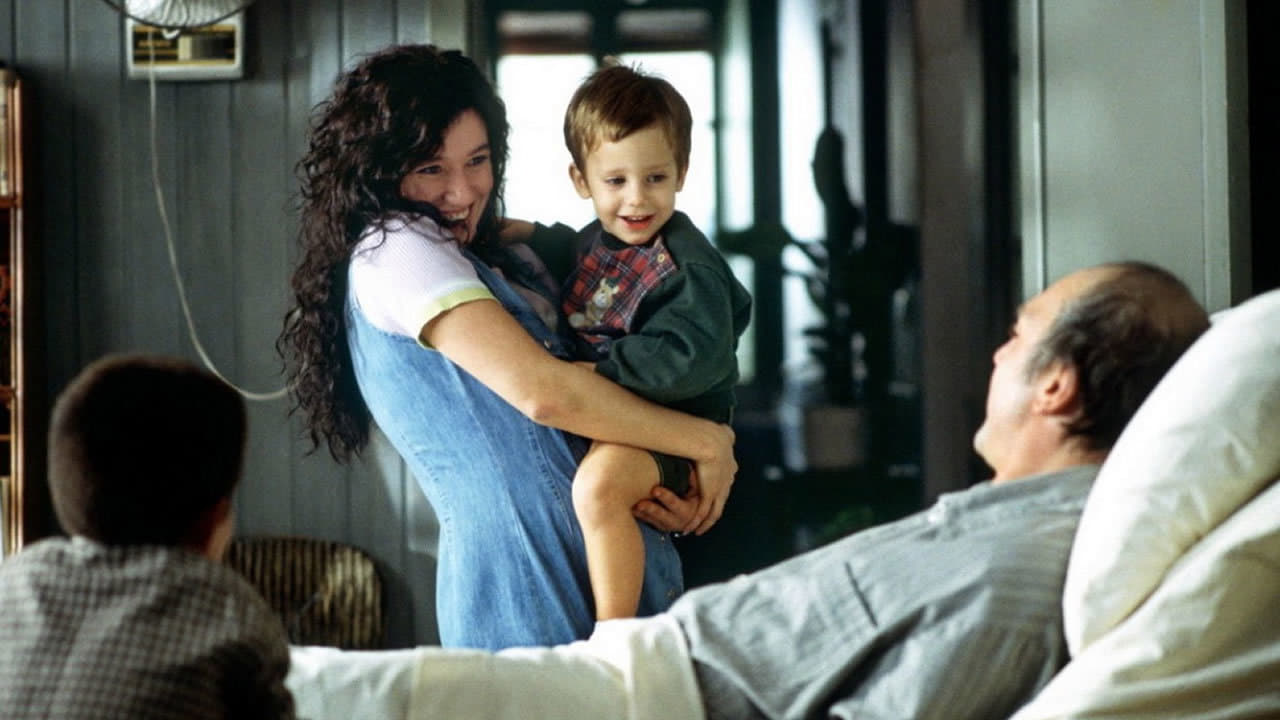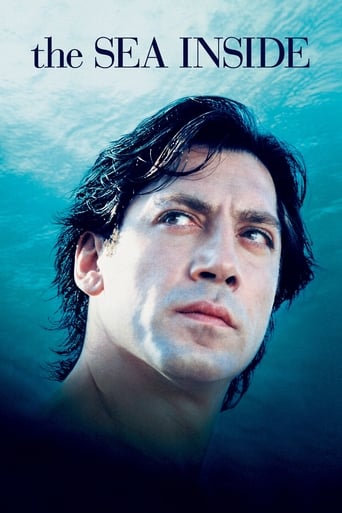

Very very predictable, including the post credit scene !!!
... View Moreone of my absolute favorites!
... View MoreI think this is a new genre that they're all sort of working their way through it and haven't got all the kinks worked out yet but it's a genre that works for me.
... View MoreThere's no way I can possibly love it entirely but I just think its ridiculously bad, but enjoyable at the same time.
... View MoreThe movie Mar adentro, released on November 14, 2004 by Alejandro Amenábar details the current life of Ramón Sampedro, a quadriplegic who was paralyzed a the age of twenty-six after diving off a cliff and breaking his neck on the ocean floor. Now, twenty-four years later at the age of fifty-four, Ramón is fighting for his right to die as he sees his own body as a prison for a man who once traveled the world and experienced a wholesome life. To him, life in this state has no dignity, and having the ability to die how he wants is a way for him to leave dignified. This movie briefly examines the issues of euthanasia and physician assisted suicide, showing some of the hardships that quadriplegics and others with chronically painful conditions experience. Having the opportunity to die how they want, in a painless way, surrounded by friends and family seems to be the goal for Ramón. He appears in court, supported by a lawyer, members of his family, and a few friends. He's petitioning the courts to change the laws, and re-examine the current ones that deny patients the right to die. Ramón planned on testifying, however, he was denied the ability to by the judges present.To this day, euthanasia is still illegal in Spain. Since 2002, patients have had the right to refuse medical treatment, such as respirators or chemotherapy, but euthanasia and assisted suicide is still a criminal offense. In the movie, religion is used as a focus in the statements of Ramón's lawyer. It was stated that even though Spain, as many other first-world countries do, claims to be a secular government, with a distinct separation between church and state. However, the lawyer claims, the law against euthanasia has its roots in religious ideas and morals. It is true, in fact, that religion still has a large influence over much of the legislation passed not only in Spain or the United States, but also in many countries all over the world. Even though many countries claim to be autonomous from religion, many lawmakers and leaders are swayed by personal beliefs and/or prejudices against certain forms of legislation, such as the right to die. For Spain, there are still elements of the Franco regime that are left over even after his death. Francoist values and beliefs regarding the merging of church and state and the influence of religion over laws and social norms are still very popular among a large portion of the population. In the movie, it is said that around 67% of the general population supported the idea of euthanasia.The film itself seemed to be very well done. The story was captivating and emotionally jarring. There were parts that were depressing, but overall there was a general uplifting feeling about the aesthetic and general feel of the film, which is something I can't quite explain or pinpoint an exact reason for. The acting was incredible. Javier Bardem, who played Ramón, and Belén Rueda, who played Julia, seemed to be stand outs for their acting. They did such a great job in conveying, what looked like, actual pain for what their characters were experiencing. On top of that, the grand wide shots of the scenery of Spain's mountains, rivers, forests and coasts were expertly wedged in between emotional scenes that really seemed to add something that was important for the characters. In some movies, there are scenes that focus on the wilderness or wide shots of scenery that seem to be out of place, but that was not the case in this film. The music was perfect for many of the scenes, and since Amenábar composed it, I think that allowed him to complete his artistic vision for the movie through the directing and composing of all aspects of his film.The message of the film was very clearly conveyed. It detailed examples of individuals who were experiencing great suffering, and had gotten to the point where they just wanted it to end. Euthanasia is a difficult topic, and there were some difficult scenes to watch in the movie, which I think is why it was so effective. There was very little sugar coating from Amenábar. However, I do feel the need to comment on the fact that I thought the issue was sensationalized in this movie. Understanding that this was a movie and not a documentary, the issue of suicide and assisted suicide is not something that is easy to talk about. On that note, though, I do not think that dramatic music and panning landscapes is the best way to provide people with exposure to the issue. It may start the conversation, but that conversation is going to be very biased and black and white towards one side or the other. With any issue that provides many moral and ethical dilemmas, everyone is going to have a strong opinion about it. I think that it is important to provide an understanding of the fact that it is not an easy decision or position to take, and instead of sensationalizing an issue like suffering and euthanasia, we need to have a serious conversation about it.Amenábar did a very good job of showcasing the point of view of the sufferer in the situation, and not just with people who are severely paralyzed. Julia, one of the other main characters, seems to be suffering from numerous strokes. She continues to have them, and every subsequent stroke provides more challenges, more physical therapy, more frustration, and more hopelessness. Understanding that people who are terminally ill are not just dealing with the physical limitations, they also have to deal with the sadness, the depression, and the feelings of hopelessness that comes with knowing that you won't ever get better. It is important to know that physical suffering can come with emotional suffering, and that emotional suffering can come with physical suffering, but also that one can arise without the other.
... View MoreI always try to to be objective when I watch a movie, regardless of my point of view and what I believe. This film deals with an important topic, delicate, in my humble opinion with great delicacy, and objectivity, without falling into banality or in rhetoric.. Javier B. gives a remarkable performance, touching, funny, fickle, difficult to play a role as her, to be honest. Heartbreaking letter to his son, I have the words that he uses to explain the pain he feels in not being able to move. The director goes on all fronts: the writer friend who change your mind, where fear makes it so human, although to be so contrary equal to him, Rose loves without asking anything in return, because it is this love, the brother in order not to lose it comes to trying to hate him, and father torn by grief that he could not do anything .... You stop to think about "I, what would I do?" I think it's an answer that you can not ever give ... .. The movie I liked a lot, I cried If you can watch it, leaving aside personal opinions, you will not regret and a good movie.Sorry for Bad English
... View MoreThe Sea Inside is a fact based story of ship mechanic Ramon Sampedro (Javier Bardem) who has spent close to 30 years fighting to earn the right to die with dignity after he was rendered a quadriplegic following a diving accident.One thing that's refreshing about this film is that it didn't feel like a heavy-handed propaganda piece; this film basically just gives the audience an account and also an insight into Ramon's life (post accident). To me the film never felt manipulative, preachy, or sappy and for the most part we're just observing Ramon explaining why he wants to end his life. The screenplay is written in such a way that we're given perspectives from individuals who both support Ramon and are against Ramon, but again neither aspect is heavy-handed and it's all just very beautiful as a whole.The dream sequences provide us with some very impressive visuals, but they also exist to develop Ramon's character; here we have a man whose body is trapped, but his mind is very much free. If we stick with character development then one could also say that it was a good move to give us a bit of back story for Ramon - we're not given much, but there's enough given to make us emotionally involved.Another benefit of good character development and wonderful insight is that when I watched Ramon I didn't pity him as a person, but I pitied his predicament. I can't imagine what it must be like to lead an active life and then to find yourself bed bound and unable to move for 20 odd years. Although the film has pro and anti Euthanasia perspectives throughout its running time, it never over does either aspect and it will certainly leaves the viewer with a lot to think about when the film ends.If you've got an open mind then this is well worth checking out.
... View MoreBased on the real-life story of Ramón Sampedro, a Spanish ship mechanic left quadriplegic after a diving accident. 'Mar adentro' is his story, it's based on the hopes he had, and on how he said good-bye to life.Alejandro Amenábar, the director of the film, makes a Gem. It's one of the most moving and enlightening experiences you'd watch. Late Ramón Sampedro was a man beyond his words, his weakness and his strength. He was a man to remember, which he has since his death. His final stages unfold with terrific direction, and some dramatic cinematography.And of course the performances: Javier Bardem is top-notch as Late Ramón Sampedro. He has proved his caliber, once again. Belén Rueda is absolutely flawless. Lola Dueñas also delivers a bravura performance. But it's Mabel Rivera, who steals the show, with an excellent performance.On the whole, ' Mar adentro' is an experience you just can't afford to miss. Two Big Thumbs Up!
... View More